Management Theories and Philosophies (PDF)
VerifiedAdded on 2021/01/02
|9
|3346
|209
AI Summary
Contribute Materials
Your contribution can guide someone’s learning journey. Share your
documents today.

Management theories and
philosophies
philosophies
Secure Best Marks with AI Grader
Need help grading? Try our AI Grader for instant feedback on your assignments.
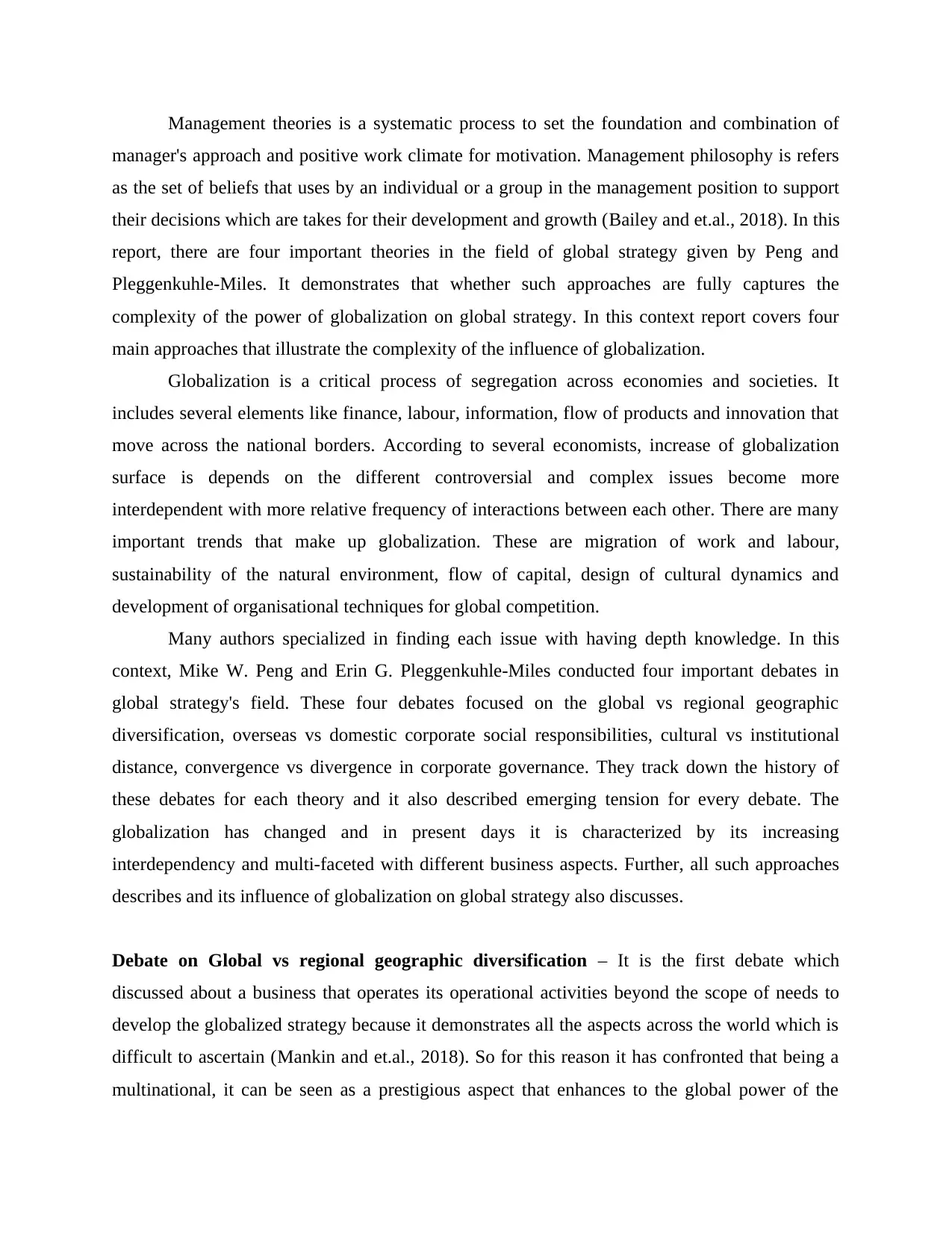
Management theories is a systematic process to set the foundation and combination of
manager's approach and positive work climate for motivation. Management philosophy is refers
as the set of beliefs that uses by an individual or a group in the management position to support
their decisions which are takes for their development and growth (Bailey and et.al., 2018). In this
report, there are four important theories in the field of global strategy given by Peng and
Pleggenkuhle-Miles. It demonstrates that whether such approaches are fully captures the
complexity of the power of globalization on global strategy. In this context report covers four
main approaches that illustrate the complexity of the influence of globalization.
Globalization is a critical process of segregation across economies and societies. It
includes several elements like finance, labour, information, flow of products and innovation that
move across the national borders. According to several economists, increase of globalization
surface is depends on the different controversial and complex issues become more
interdependent with more relative frequency of interactions between each other. There are many
important trends that make up globalization. These are migration of work and labour,
sustainability of the natural environment, flow of capital, design of cultural dynamics and
development of organisational techniques for global competition.
Many authors specialized in finding each issue with having depth knowledge. In this
context, Mike W. Peng and Erin G. Pleggenkuhle-Miles conducted four important debates in
global strategy's field. These four debates focused on the global vs regional geographic
diversification, overseas vs domestic corporate social responsibilities, cultural vs institutional
distance, convergence vs divergence in corporate governance. They track down the history of
these debates for each theory and it also described emerging tension for every debate. The
globalization has changed and in present days it is characterized by its increasing
interdependency and multi-faceted with different business aspects. Further, all such approaches
describes and its influence of globalization on global strategy also discusses.
Debate on Global vs regional geographic diversification – It is the first debate which
discussed about a business that operates its operational activities beyond the scope of needs to
develop the globalized strategy because it demonstrates all the aspects across the world which is
difficult to ascertain (Mankin and et.al., 2018). So for this reason it has confronted that being a
multinational, it can be seen as a prestigious aspect that enhances to the global power of the
manager's approach and positive work climate for motivation. Management philosophy is refers
as the set of beliefs that uses by an individual or a group in the management position to support
their decisions which are takes for their development and growth (Bailey and et.al., 2018). In this
report, there are four important theories in the field of global strategy given by Peng and
Pleggenkuhle-Miles. It demonstrates that whether such approaches are fully captures the
complexity of the power of globalization on global strategy. In this context report covers four
main approaches that illustrate the complexity of the influence of globalization.
Globalization is a critical process of segregation across economies and societies. It
includes several elements like finance, labour, information, flow of products and innovation that
move across the national borders. According to several economists, increase of globalization
surface is depends on the different controversial and complex issues become more
interdependent with more relative frequency of interactions between each other. There are many
important trends that make up globalization. These are migration of work and labour,
sustainability of the natural environment, flow of capital, design of cultural dynamics and
development of organisational techniques for global competition.
Many authors specialized in finding each issue with having depth knowledge. In this
context, Mike W. Peng and Erin G. Pleggenkuhle-Miles conducted four important debates in
global strategy's field. These four debates focused on the global vs regional geographic
diversification, overseas vs domestic corporate social responsibilities, cultural vs institutional
distance, convergence vs divergence in corporate governance. They track down the history of
these debates for each theory and it also described emerging tension for every debate. The
globalization has changed and in present days it is characterized by its increasing
interdependency and multi-faceted with different business aspects. Further, all such approaches
describes and its influence of globalization on global strategy also discusses.
Debate on Global vs regional geographic diversification – It is the first debate which
discussed about a business that operates its operational activities beyond the scope of needs to
develop the globalized strategy because it demonstrates all the aspects across the world which is
difficult to ascertain (Mankin and et.al., 2018). So for this reason it has confronted that being a
multinational, it can be seen as a prestigious aspect that enhances to the global power of the
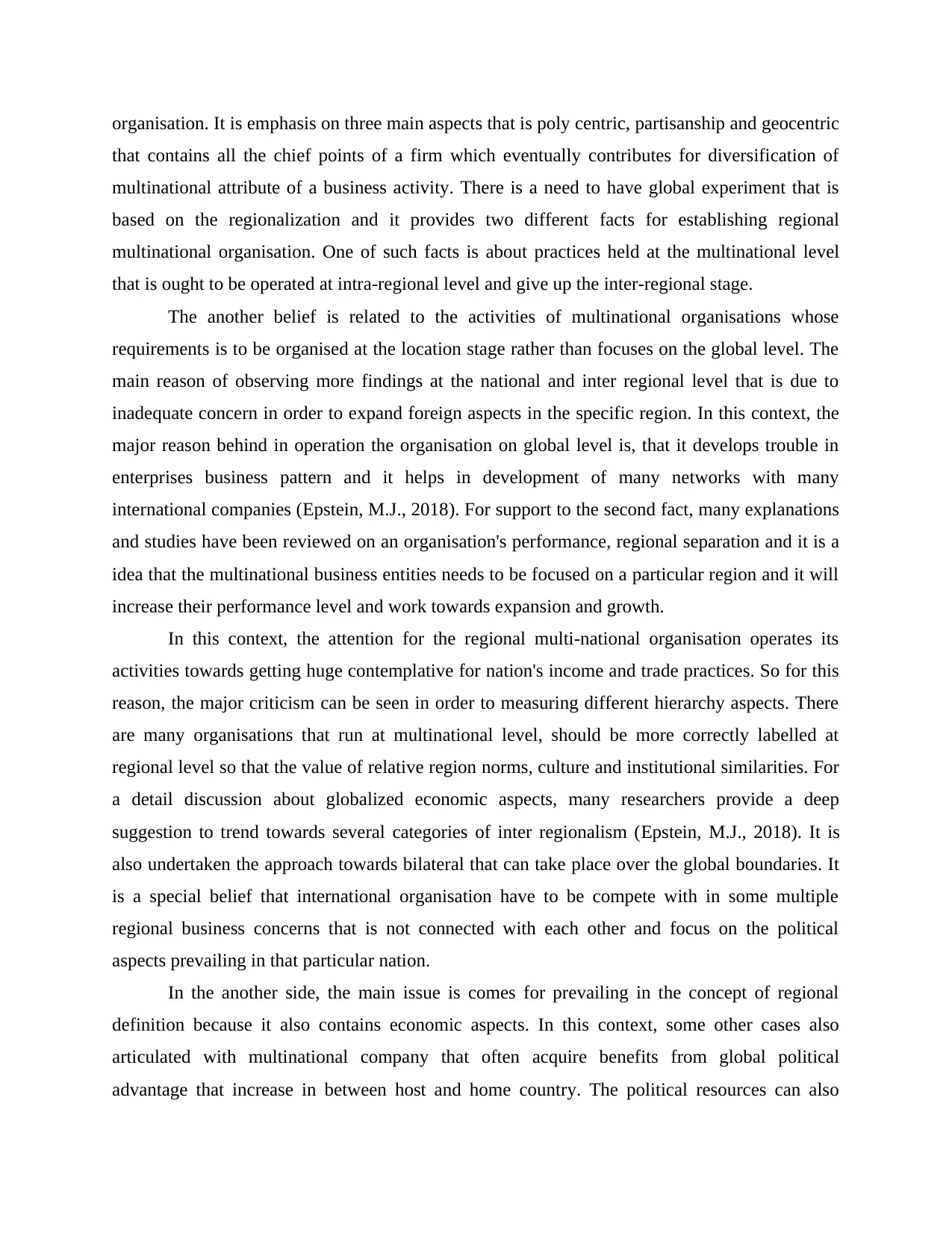
organisation. It is emphasis on three main aspects that is poly centric, partisanship and geocentric
that contains all the chief points of a firm which eventually contributes for diversification of
multinational attribute of a business activity. There is a need to have global experiment that is
based on the regionalization and it provides two different facts for establishing regional
multinational organisation. One of such facts is about practices held at the multinational level
that is ought to be operated at intra-regional level and give up the inter-regional stage.
The another belief is related to the activities of multinational organisations whose
requirements is to be organised at the location stage rather than focuses on the global level. The
main reason of observing more findings at the national and inter regional level that is due to
inadequate concern in order to expand foreign aspects in the specific region. In this context, the
major reason behind in operation the organisation on global level is, that it develops trouble in
enterprises business pattern and it helps in development of many networks with many
international companies (Epstein, M.J., 2018). For support to the second fact, many explanations
and studies have been reviewed on an organisation's performance, regional separation and it is a
idea that the multinational business entities needs to be focused on a particular region and it will
increase their performance level and work towards expansion and growth.
In this context, the attention for the regional multi-national organisation operates its
activities towards getting huge contemplative for nation's income and trade practices. So for this
reason, the major criticism can be seen in order to measuring different hierarchy aspects. There
are many organisations that run at multinational level, should be more correctly labelled at
regional level so that the value of relative region norms, culture and institutional similarities. For
a detail discussion about globalized economic aspects, many researchers provide a deep
suggestion to trend towards several categories of inter regionalism (Epstein, M.J., 2018). It is
also undertaken the approach towards bilateral that can take place over the global boundaries. It
is a special belief that international organisation have to be compete with in some multiple
regional business concerns that is not connected with each other and focus on the political
aspects prevailing in that particular nation.
In the another side, the main issue is comes for prevailing in the concept of regional
definition because it also contains economic aspects. In this context, some other cases also
articulated with multinational company that often acquire benefits from global political
advantage that increase in between host and home country. The political resources can also
that contains all the chief points of a firm which eventually contributes for diversification of
multinational attribute of a business activity. There is a need to have global experiment that is
based on the regionalization and it provides two different facts for establishing regional
multinational organisation. One of such facts is about practices held at the multinational level
that is ought to be operated at intra-regional level and give up the inter-regional stage.
The another belief is related to the activities of multinational organisations whose
requirements is to be organised at the location stage rather than focuses on the global level. The
main reason of observing more findings at the national and inter regional level that is due to
inadequate concern in order to expand foreign aspects in the specific region. In this context, the
major reason behind in operation the organisation on global level is, that it develops trouble in
enterprises business pattern and it helps in development of many networks with many
international companies (Epstein, M.J., 2018). For support to the second fact, many explanations
and studies have been reviewed on an organisation's performance, regional separation and it is a
idea that the multinational business entities needs to be focused on a particular region and it will
increase their performance level and work towards expansion and growth.
In this context, the attention for the regional multi-national organisation operates its
activities towards getting huge contemplative for nation's income and trade practices. So for this
reason, the major criticism can be seen in order to measuring different hierarchy aspects. There
are many organisations that run at multinational level, should be more correctly labelled at
regional level so that the value of relative region norms, culture and institutional similarities. For
a detail discussion about globalized economic aspects, many researchers provide a deep
suggestion to trend towards several categories of inter regionalism (Epstein, M.J., 2018). It is
also undertaken the approach towards bilateral that can take place over the global boundaries. It
is a special belief that international organisation have to be compete with in some multiple
regional business concerns that is not connected with each other and focus on the political
aspects prevailing in that particular nation.
In the another side, the main issue is comes for prevailing in the concept of regional
definition because it also contains economic aspects. In this context, some other cases also
articulated with multinational company that often acquire benefits from global political
advantage that increase in between host and home country. The political resources can also
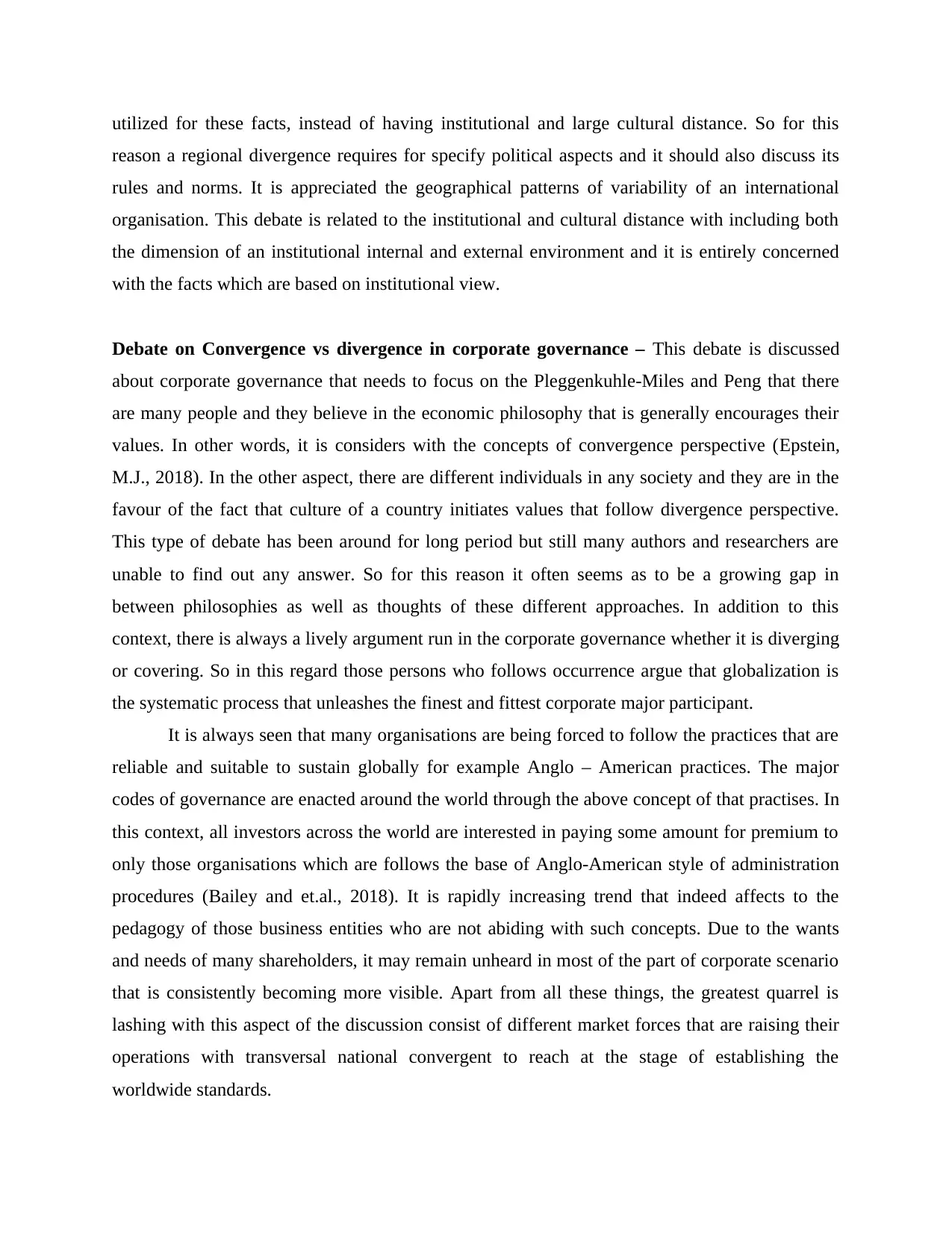
utilized for these facts, instead of having institutional and large cultural distance. So for this
reason a regional divergence requires for specify political aspects and it should also discuss its
rules and norms. It is appreciated the geographical patterns of variability of an international
organisation. This debate is related to the institutional and cultural distance with including both
the dimension of an institutional internal and external environment and it is entirely concerned
with the facts which are based on institutional view.
Debate on Convergence vs divergence in corporate governance – This debate is discussed
about corporate governance that needs to focus on the Pleggenkuhle-Miles and Peng that there
are many people and they believe in the economic philosophy that is generally encourages their
values. In other words, it is considers with the concepts of convergence perspective (Epstein,
M.J., 2018). In the other aspect, there are different individuals in any society and they are in the
favour of the fact that culture of a country initiates values that follow divergence perspective.
This type of debate has been around for long period but still many authors and researchers are
unable to find out any answer. So for this reason it often seems as to be a growing gap in
between philosophies as well as thoughts of these different approaches. In addition to this
context, there is always a lively argument run in the corporate governance whether it is diverging
or covering. So in this regard those persons who follows occurrence argue that globalization is
the systematic process that unleashes the finest and fittest corporate major participant.
It is always seen that many organisations are being forced to follow the practices that are
reliable and suitable to sustain globally for example Anglo – American practices. The major
codes of governance are enacted around the world through the above concept of that practises. In
this context, all investors across the world are interested in paying some amount for premium to
only those organisations which are follows the base of Anglo-American style of administration
procedures (Bailey and et.al., 2018). It is rapidly increasing trend that indeed affects to the
pedagogy of those business entities who are not abiding with such concepts. Due to the wants
and needs of many shareholders, it may remain unheard in most of the part of corporate scenario
that is consistently becoming more visible. Apart from all these things, the greatest quarrel is
lashing with this aspect of the discussion consist of different market forces that are raising their
operations with transversal national convergent to reach at the stage of establishing the
worldwide standards.
reason a regional divergence requires for specify political aspects and it should also discuss its
rules and norms. It is appreciated the geographical patterns of variability of an international
organisation. This debate is related to the institutional and cultural distance with including both
the dimension of an institutional internal and external environment and it is entirely concerned
with the facts which are based on institutional view.
Debate on Convergence vs divergence in corporate governance – This debate is discussed
about corporate governance that needs to focus on the Pleggenkuhle-Miles and Peng that there
are many people and they believe in the economic philosophy that is generally encourages their
values. In other words, it is considers with the concepts of convergence perspective (Epstein,
M.J., 2018). In the other aspect, there are different individuals in any society and they are in the
favour of the fact that culture of a country initiates values that follow divergence perspective.
This type of debate has been around for long period but still many authors and researchers are
unable to find out any answer. So for this reason it often seems as to be a growing gap in
between philosophies as well as thoughts of these different approaches. In addition to this
context, there is always a lively argument run in the corporate governance whether it is diverging
or covering. So in this regard those persons who follows occurrence argue that globalization is
the systematic process that unleashes the finest and fittest corporate major participant.
It is always seen that many organisations are being forced to follow the practices that are
reliable and suitable to sustain globally for example Anglo – American practices. The major
codes of governance are enacted around the world through the above concept of that practises. In
this context, all investors across the world are interested in paying some amount for premium to
only those organisations which are follows the base of Anglo-American style of administration
procedures (Bailey and et.al., 2018). It is rapidly increasing trend that indeed affects to the
pedagogy of those business entities who are not abiding with such concepts. Due to the wants
and needs of many shareholders, it may remain unheard in most of the part of corporate scenario
that is consistently becoming more visible. Apart from all these things, the greatest quarrel is
lashing with this aspect of the discussion consist of different market forces that are raising their
operations with transversal national convergent to reach at the stage of establishing the
worldwide standards.
Secure Best Marks with AI Grader
Need help grading? Try our AI Grader for instant feedback on your assignments.
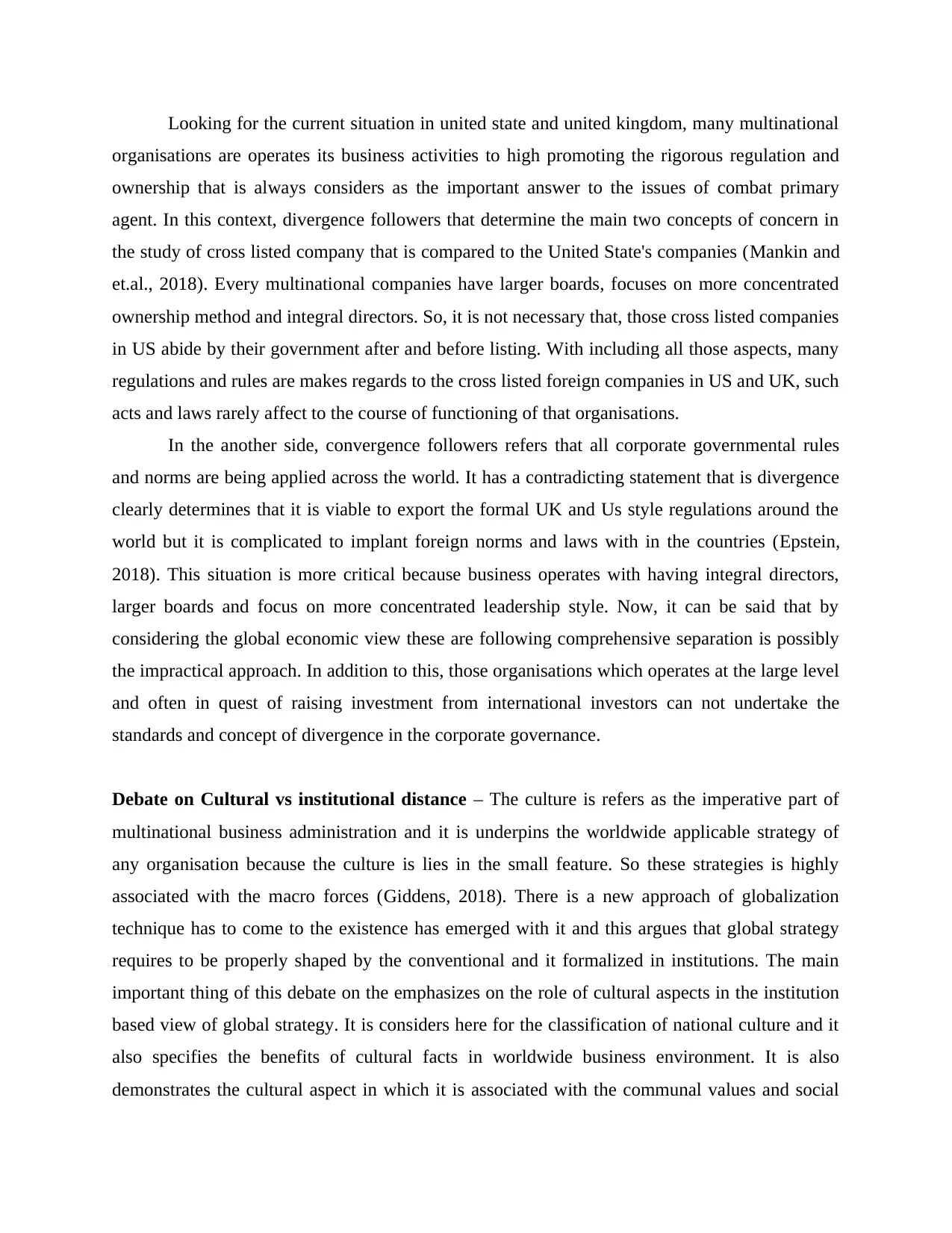
Looking for the current situation in united state and united kingdom, many multinational
organisations are operates its business activities to high promoting the rigorous regulation and
ownership that is always considers as the important answer to the issues of combat primary
agent. In this context, divergence followers that determine the main two concepts of concern in
the study of cross listed company that is compared to the United State's companies (Mankin and
et.al., 2018). Every multinational companies have larger boards, focuses on more concentrated
ownership method and integral directors. So, it is not necessary that, those cross listed companies
in US abide by their government after and before listing. With including all those aspects, many
regulations and rules are makes regards to the cross listed foreign companies in US and UK, such
acts and laws rarely affect to the course of functioning of that organisations.
In the another side, convergence followers refers that all corporate governmental rules
and norms are being applied across the world. It has a contradicting statement that is divergence
clearly determines that it is viable to export the formal UK and Us style regulations around the
world but it is complicated to implant foreign norms and laws with in the countries (Epstein,
2018). This situation is more critical because business operates with having integral directors,
larger boards and focus on more concentrated leadership style. Now, it can be said that by
considering the global economic view these are following comprehensive separation is possibly
the impractical approach. In addition to this, those organisations which operates at the large level
and often in quest of raising investment from international investors can not undertake the
standards and concept of divergence in the corporate governance.
Debate on Cultural vs institutional distance – The culture is refers as the imperative part of
multinational business administration and it is underpins the worldwide applicable strategy of
any organisation because the culture is lies in the small feature. So these strategies is highly
associated with the macro forces (Giddens, 2018). There is a new approach of globalization
technique has to come to the existence has emerged with it and this argues that global strategy
requires to be properly shaped by the conventional and it formalized in institutions. The main
important thing of this debate on the emphasizes on the role of cultural aspects in the institution
based view of global strategy. It is considers here for the classification of national culture and it
also specifies the benefits of cultural facts in worldwide business environment. It is also
demonstrates the cultural aspect in which it is associated with the communal values and social
organisations are operates its business activities to high promoting the rigorous regulation and
ownership that is always considers as the important answer to the issues of combat primary
agent. In this context, divergence followers that determine the main two concepts of concern in
the study of cross listed company that is compared to the United State's companies (Mankin and
et.al., 2018). Every multinational companies have larger boards, focuses on more concentrated
ownership method and integral directors. So, it is not necessary that, those cross listed companies
in US abide by their government after and before listing. With including all those aspects, many
regulations and rules are makes regards to the cross listed foreign companies in US and UK, such
acts and laws rarely affect to the course of functioning of that organisations.
In the another side, convergence followers refers that all corporate governmental rules
and norms are being applied across the world. It has a contradicting statement that is divergence
clearly determines that it is viable to export the formal UK and Us style regulations around the
world but it is complicated to implant foreign norms and laws with in the countries (Epstein,
2018). This situation is more critical because business operates with having integral directors,
larger boards and focus on more concentrated leadership style. Now, it can be said that by
considering the global economic view these are following comprehensive separation is possibly
the impractical approach. In addition to this, those organisations which operates at the large level
and often in quest of raising investment from international investors can not undertake the
standards and concept of divergence in the corporate governance.
Debate on Cultural vs institutional distance – The culture is refers as the imperative part of
multinational business administration and it is underpins the worldwide applicable strategy of
any organisation because the culture is lies in the small feature. So these strategies is highly
associated with the macro forces (Giddens, 2018). There is a new approach of globalization
technique has to come to the existence has emerged with it and this argues that global strategy
requires to be properly shaped by the conventional and it formalized in institutions. The main
important thing of this debate on the emphasizes on the role of cultural aspects in the institution
based view of global strategy. It is considers here for the classification of national culture and it
also specifies the benefits of cultural facts in worldwide business environment. It is also
demonstrates the cultural aspect in which it is associated with the communal values and social
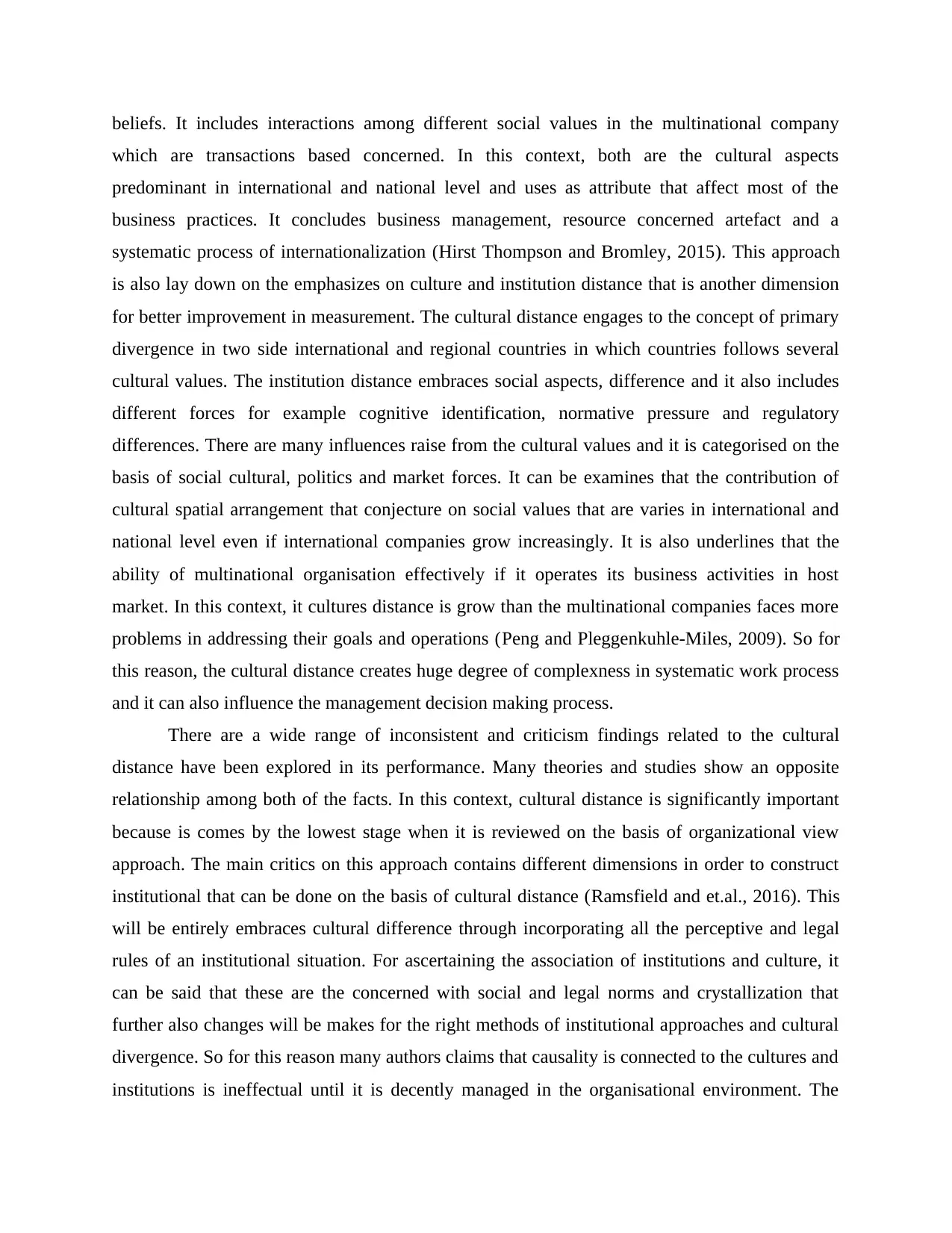
beliefs. It includes interactions among different social values in the multinational company
which are transactions based concerned. In this context, both are the cultural aspects
predominant in international and national level and uses as attribute that affect most of the
business practices. It concludes business management, resource concerned artefact and a
systematic process of internationalization (Hirst Thompson and Bromley, 2015). This approach
is also lay down on the emphasizes on culture and institution distance that is another dimension
for better improvement in measurement. The cultural distance engages to the concept of primary
divergence in two side international and regional countries in which countries follows several
cultural values. The institution distance embraces social aspects, difference and it also includes
different forces for example cognitive identification, normative pressure and regulatory
differences. There are many influences raise from the cultural values and it is categorised on the
basis of social cultural, politics and market forces. It can be examines that the contribution of
cultural spatial arrangement that conjecture on social values that are varies in international and
national level even if international companies grow increasingly. It is also underlines that the
ability of multinational organisation effectively if it operates its business activities in host
market. In this context, it cultures distance is grow than the multinational companies faces more
problems in addressing their goals and operations (Peng and Pleggenkuhle-Miles, 2009). So for
this reason, the cultural distance creates huge degree of complexness in systematic work process
and it can also influence the management decision making process.
There are a wide range of inconsistent and criticism findings related to the cultural
distance have been explored in its performance. Many theories and studies show an opposite
relationship among both of the facts. In this context, cultural distance is significantly important
because is comes by the lowest stage when it is reviewed on the basis of organizational view
approach. The main critics on this approach contains different dimensions in order to construct
institutional that can be done on the basis of cultural distance (Ramsfield and et.al., 2016). This
will be entirely embraces cultural difference through incorporating all the perceptive and legal
rules of an institutional situation. For ascertaining the association of institutions and culture, it
can be said that these are the concerned with social and legal norms and crystallization that
further also changes will be makes for the right methods of institutional approaches and cultural
divergence. So for this reason many authors claims that causality is connected to the cultures and
institutions is ineffectual until it is decently managed in the organisational environment. The
which are transactions based concerned. In this context, both are the cultural aspects
predominant in international and national level and uses as attribute that affect most of the
business practices. It concludes business management, resource concerned artefact and a
systematic process of internationalization (Hirst Thompson and Bromley, 2015). This approach
is also lay down on the emphasizes on culture and institution distance that is another dimension
for better improvement in measurement. The cultural distance engages to the concept of primary
divergence in two side international and regional countries in which countries follows several
cultural values. The institution distance embraces social aspects, difference and it also includes
different forces for example cognitive identification, normative pressure and regulatory
differences. There are many influences raise from the cultural values and it is categorised on the
basis of social cultural, politics and market forces. It can be examines that the contribution of
cultural spatial arrangement that conjecture on social values that are varies in international and
national level even if international companies grow increasingly. It is also underlines that the
ability of multinational organisation effectively if it operates its business activities in host
market. In this context, it cultures distance is grow than the multinational companies faces more
problems in addressing their goals and operations (Peng and Pleggenkuhle-Miles, 2009). So for
this reason, the cultural distance creates huge degree of complexness in systematic work process
and it can also influence the management decision making process.
There are a wide range of inconsistent and criticism findings related to the cultural
distance have been explored in its performance. Many theories and studies show an opposite
relationship among both of the facts. In this context, cultural distance is significantly important
because is comes by the lowest stage when it is reviewed on the basis of organizational view
approach. The main critics on this approach contains different dimensions in order to construct
institutional that can be done on the basis of cultural distance (Ramsfield and et.al., 2016). This
will be entirely embraces cultural difference through incorporating all the perceptive and legal
rules of an institutional situation. For ascertaining the association of institutions and culture, it
can be said that these are the concerned with social and legal norms and crystallization that
further also changes will be makes for the right methods of institutional approaches and cultural
divergence. So for this reason many authors claims that causality is connected to the cultures and
institutions is ineffectual until it is decently managed in the organisational environment. The
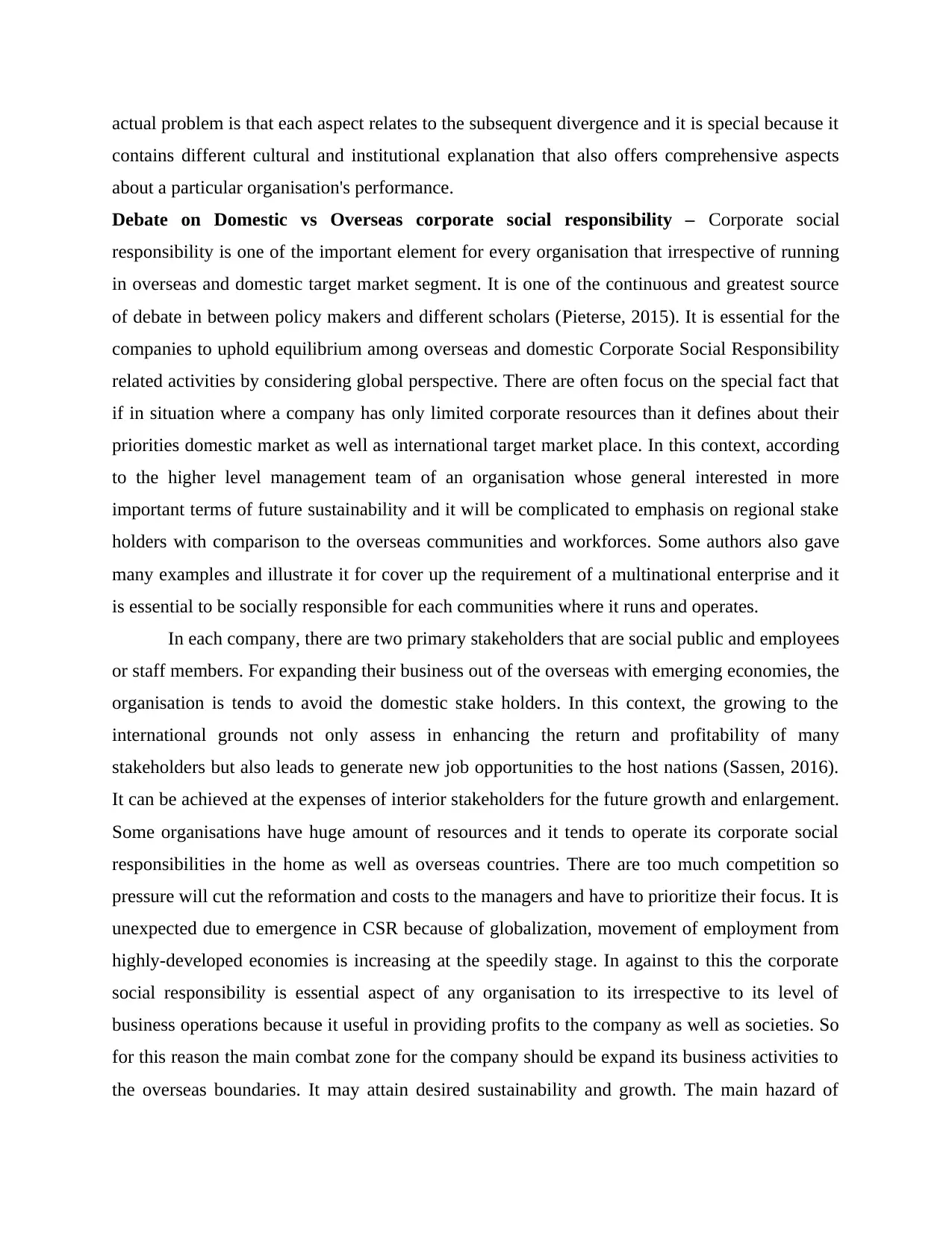
actual problem is that each aspect relates to the subsequent divergence and it is special because it
contains different cultural and institutional explanation that also offers comprehensive aspects
about a particular organisation's performance.
Debate on Domestic vs Overseas corporate social responsibility – Corporate social
responsibility is one of the important element for every organisation that irrespective of running
in overseas and domestic target market segment. It is one of the continuous and greatest source
of debate in between policy makers and different scholars (Pieterse, 2015). It is essential for the
companies to uphold equilibrium among overseas and domestic Corporate Social Responsibility
related activities by considering global perspective. There are often focus on the special fact that
if in situation where a company has only limited corporate resources than it defines about their
priorities domestic market as well as international target market place. In this context, according
to the higher level management team of an organisation whose general interested in more
important terms of future sustainability and it will be complicated to emphasis on regional stake
holders with comparison to the overseas communities and workforces. Some authors also gave
many examples and illustrate it for cover up the requirement of a multinational enterprise and it
is essential to be socially responsible for each communities where it runs and operates.
In each company, there are two primary stakeholders that are social public and employees
or staff members. For expanding their business out of the overseas with emerging economies, the
organisation is tends to avoid the domestic stake holders. In this context, the growing to the
international grounds not only assess in enhancing the return and profitability of many
stakeholders but also leads to generate new job opportunities to the host nations (Sassen, 2016).
It can be achieved at the expenses of interior stakeholders for the future growth and enlargement.
Some organisations have huge amount of resources and it tends to operate its corporate social
responsibilities in the home as well as overseas countries. There are too much competition so
pressure will cut the reformation and costs to the managers and have to prioritize their focus. It is
unexpected due to emergence in CSR because of globalization, movement of employment from
highly-developed economies is increasing at the speedily stage. In against to this the corporate
social responsibility is essential aspect of any organisation to its irrespective to its level of
business operations because it useful in providing profits to the company as well as societies. So
for this reason the main combat zone for the company should be expand its business activities to
the overseas boundaries. It may attain desired sustainability and growth. The main hazard of
contains different cultural and institutional explanation that also offers comprehensive aspects
about a particular organisation's performance.
Debate on Domestic vs Overseas corporate social responsibility – Corporate social
responsibility is one of the important element for every organisation that irrespective of running
in overseas and domestic target market segment. It is one of the continuous and greatest source
of debate in between policy makers and different scholars (Pieterse, 2015). It is essential for the
companies to uphold equilibrium among overseas and domestic Corporate Social Responsibility
related activities by considering global perspective. There are often focus on the special fact that
if in situation where a company has only limited corporate resources than it defines about their
priorities domestic market as well as international target market place. In this context, according
to the higher level management team of an organisation whose general interested in more
important terms of future sustainability and it will be complicated to emphasis on regional stake
holders with comparison to the overseas communities and workforces. Some authors also gave
many examples and illustrate it for cover up the requirement of a multinational enterprise and it
is essential to be socially responsible for each communities where it runs and operates.
In each company, there are two primary stakeholders that are social public and employees
or staff members. For expanding their business out of the overseas with emerging economies, the
organisation is tends to avoid the domestic stake holders. In this context, the growing to the
international grounds not only assess in enhancing the return and profitability of many
stakeholders but also leads to generate new job opportunities to the host nations (Sassen, 2016).
It can be achieved at the expenses of interior stakeholders for the future growth and enlargement.
Some organisations have huge amount of resources and it tends to operate its corporate social
responsibilities in the home as well as overseas countries. There are too much competition so
pressure will cut the reformation and costs to the managers and have to prioritize their focus. It is
unexpected due to emergence in CSR because of globalization, movement of employment from
highly-developed economies is increasing at the speedily stage. In against to this the corporate
social responsibility is essential aspect of any organisation to its irrespective to its level of
business operations because it useful in providing profits to the company as well as societies. So
for this reason the main combat zone for the company should be expand its business activities to
the overseas boundaries. It may attain desired sustainability and growth. The main hazard of
Paraphrase This Document
Need a fresh take? Get an instant paraphrase of this document with our AI Paraphraser
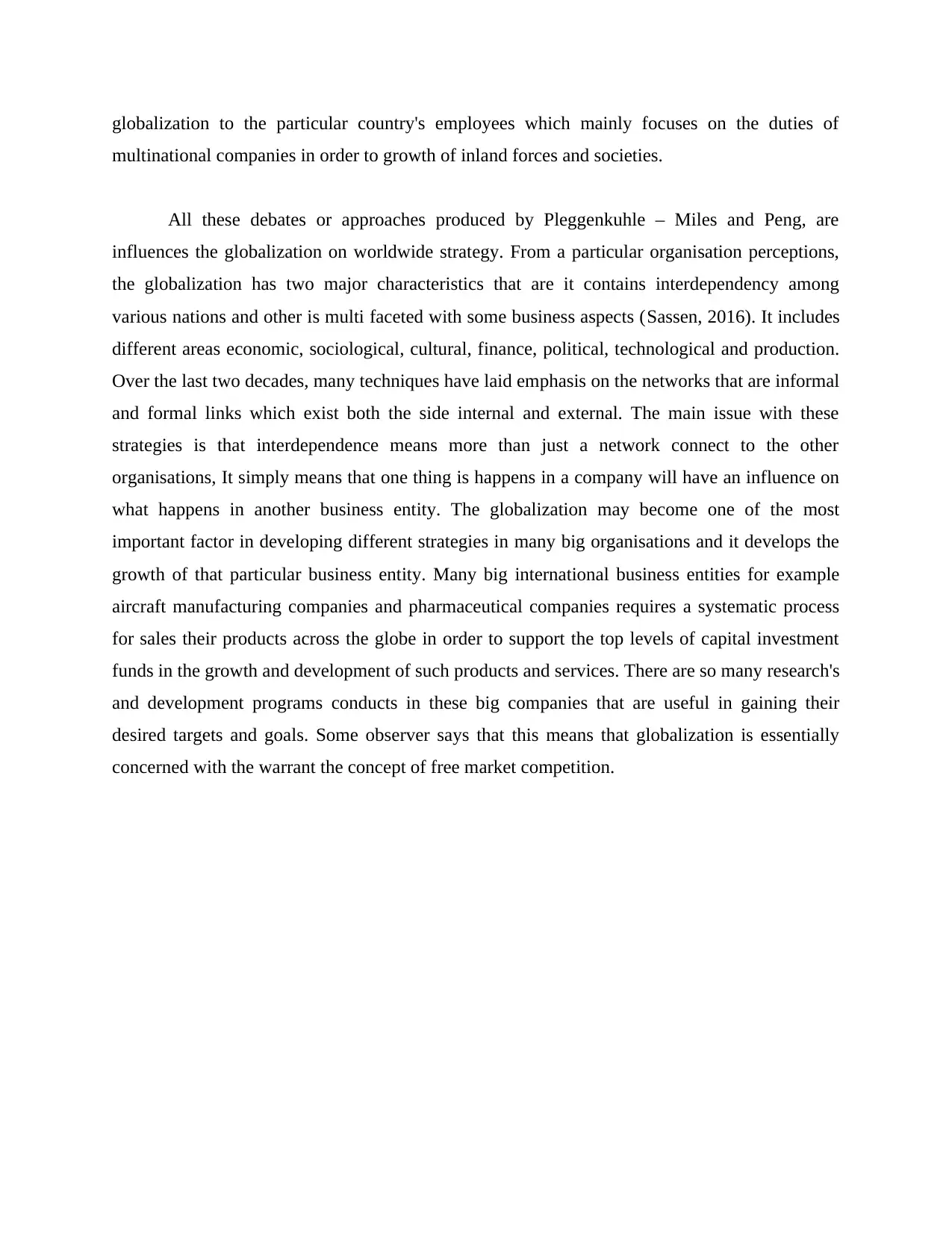
globalization to the particular country's employees which mainly focuses on the duties of
multinational companies in order to growth of inland forces and societies.
All these debates or approaches produced by Pleggenkuhle – Miles and Peng, are
influences the globalization on worldwide strategy. From a particular organisation perceptions,
the globalization has two major characteristics that are it contains interdependency among
various nations and other is multi faceted with some business aspects (Sassen, 2016). It includes
different areas economic, sociological, cultural, finance, political, technological and production.
Over the last two decades, many techniques have laid emphasis on the networks that are informal
and formal links which exist both the side internal and external. The main issue with these
strategies is that interdependence means more than just a network connect to the other
organisations, It simply means that one thing is happens in a company will have an influence on
what happens in another business entity. The globalization may become one of the most
important factor in developing different strategies in many big organisations and it develops the
growth of that particular business entity. Many big international business entities for example
aircraft manufacturing companies and pharmaceutical companies requires a systematic process
for sales their products across the globe in order to support the top levels of capital investment
funds in the growth and development of such products and services. There are so many research's
and development programs conducts in these big companies that are useful in gaining their
desired targets and goals. Some observer says that this means that globalization is essentially
concerned with the warrant the concept of free market competition.
multinational companies in order to growth of inland forces and societies.
All these debates or approaches produced by Pleggenkuhle – Miles and Peng, are
influences the globalization on worldwide strategy. From a particular organisation perceptions,
the globalization has two major characteristics that are it contains interdependency among
various nations and other is multi faceted with some business aspects (Sassen, 2016). It includes
different areas economic, sociological, cultural, finance, political, technological and production.
Over the last two decades, many techniques have laid emphasis on the networks that are informal
and formal links which exist both the side internal and external. The main issue with these
strategies is that interdependence means more than just a network connect to the other
organisations, It simply means that one thing is happens in a company will have an influence on
what happens in another business entity. The globalization may become one of the most
important factor in developing different strategies in many big organisations and it develops the
growth of that particular business entity. Many big international business entities for example
aircraft manufacturing companies and pharmaceutical companies requires a systematic process
for sales their products across the globe in order to support the top levels of capital investment
funds in the growth and development of such products and services. There are so many research's
and development programs conducts in these big companies that are useful in gaining their
desired targets and goals. Some observer says that this means that globalization is essentially
concerned with the warrant the concept of free market competition.
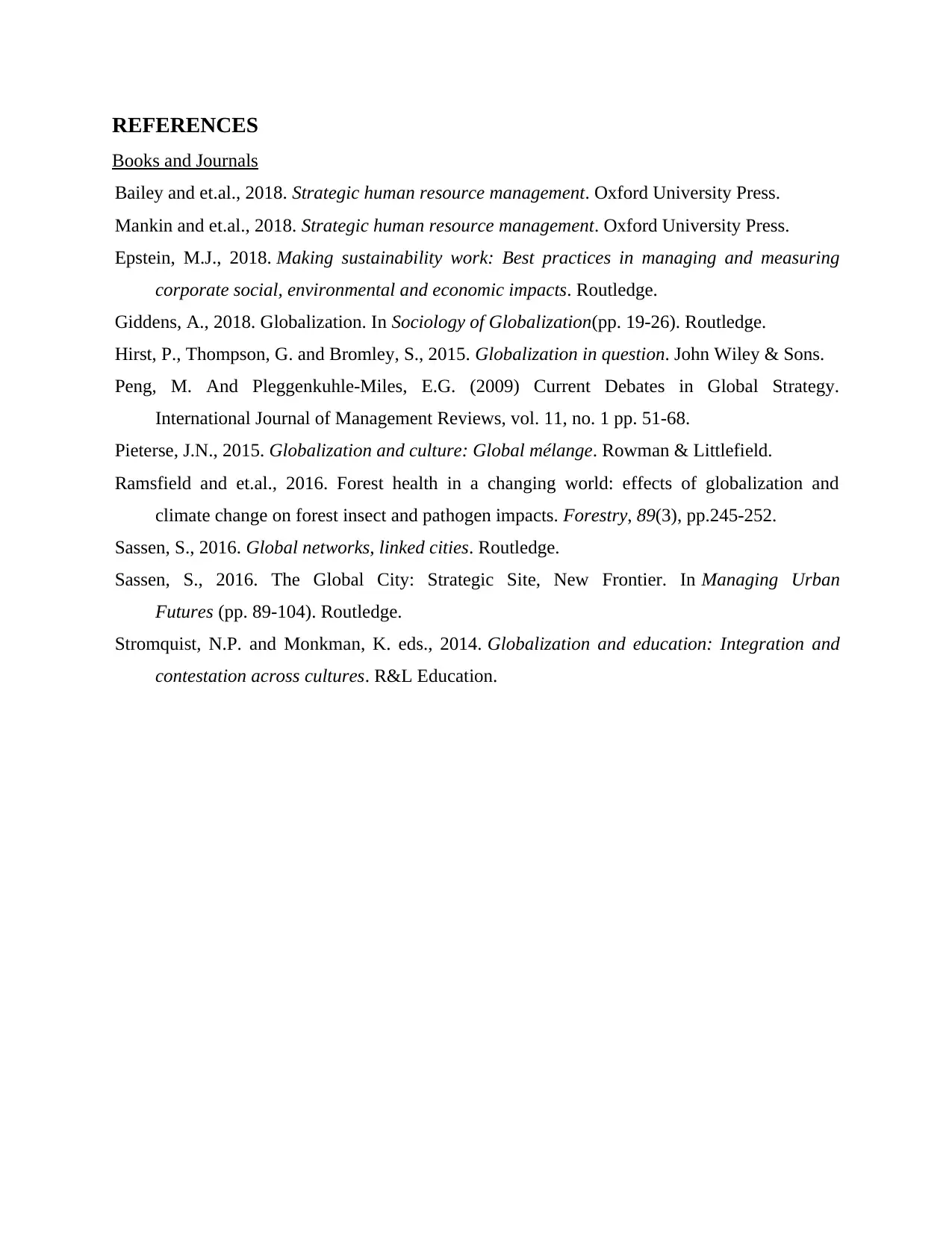
REFERENCES
Books and Journals
Bailey and et.al., 2018. Strategic human resource management. Oxford University Press.
Mankin and et.al., 2018. Strategic human resource management. Oxford University Press.
Epstein, M.J., 2018. Making sustainability work: Best practices in managing and measuring
corporate social, environmental and economic impacts. Routledge.
Giddens, A., 2018. Globalization. In Sociology of Globalization(pp. 19-26). Routledge.
Hirst, P., Thompson, G. and Bromley, S., 2015. Globalization in question. John Wiley & Sons.
Peng, M. And Pleggenkuhle-Miles, E.G. (2009) Current Debates in Global Strategy.
International Journal of Management Reviews, vol. 11, no. 1 pp. 51-68.
Pieterse, J.N., 2015. Globalization and culture: Global mélange. Rowman & Littlefield.
Ramsfield and et.al., 2016. Forest health in a changing world: effects of globalization and
climate change on forest insect and pathogen impacts. Forestry, 89(3), pp.245-252.
Sassen, S., 2016. Global networks, linked cities. Routledge.
Sassen, S., 2016. The Global City: Strategic Site, New Frontier. In Managing Urban
Futures (pp. 89-104). Routledge.
Stromquist, N.P. and Monkman, K. eds., 2014. Globalization and education: Integration and
contestation across cultures. R&L Education.
Books and Journals
Bailey and et.al., 2018. Strategic human resource management. Oxford University Press.
Mankin and et.al., 2018. Strategic human resource management. Oxford University Press.
Epstein, M.J., 2018. Making sustainability work: Best practices in managing and measuring
corporate social, environmental and economic impacts. Routledge.
Giddens, A., 2018. Globalization. In Sociology of Globalization(pp. 19-26). Routledge.
Hirst, P., Thompson, G. and Bromley, S., 2015. Globalization in question. John Wiley & Sons.
Peng, M. And Pleggenkuhle-Miles, E.G. (2009) Current Debates in Global Strategy.
International Journal of Management Reviews, vol. 11, no. 1 pp. 51-68.
Pieterse, J.N., 2015. Globalization and culture: Global mélange. Rowman & Littlefield.
Ramsfield and et.al., 2016. Forest health in a changing world: effects of globalization and
climate change on forest insect and pathogen impacts. Forestry, 89(3), pp.245-252.
Sassen, S., 2016. Global networks, linked cities. Routledge.
Sassen, S., 2016. The Global City: Strategic Site, New Frontier. In Managing Urban
Futures (pp. 89-104). Routledge.
Stromquist, N.P. and Monkman, K. eds., 2014. Globalization and education: Integration and
contestation across cultures. R&L Education.
1 out of 9
Your All-in-One AI-Powered Toolkit for Academic Success.
+13062052269
info@desklib.com
Available 24*7 on WhatsApp / Email
![[object Object]](/_next/static/media/star-bottom.7253800d.svg)
Unlock your academic potential
© 2024 | Zucol Services PVT LTD | All rights reserved.

